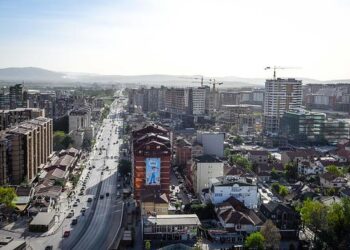Kosovo veterans have staged a rally in protest against a European Union-backed court tasked with prosecuting former fighters from the country’s war of independence. The demonstration, which took place amid rising tensions in the Balkans, underscores the deep divisions surrounding efforts to hold former combatants accountable for alleged war crimes. Critics argue that the special tribunal undermines Kosovo’s hard-won sovereignty and unfairly targets those celebrated as national heroes. The situation highlights the ongoing challenges in reconciling justice and national identity in the post-conflict region.
Kosovo Veterans Protest EU-Backed Court Targeting Former Independence Fighters
Demonstrators from the Kosovo War veteran community gathered in Pristina this week, expressing their vehement opposition to ongoing legal proceedings led by an EU-backed court aimed at prosecuting former fighters. Veterans argue that these trials undermine the sacrifices made during Kosovo’s fight for independence and threaten to destabilize the fragile political landscape. The protestors carried banners denouncing what they call “political persecution” and questioned the legitimacy of institutions perceived as external impositions on Kosovo’s sovereignty.
Key demands presented by the veterans include:
- A suspension of all prosecutions against independence fighters until full transparency is ensured
- An official recognition of their role in securing Kosovo’s freedom
- Greater consultation between local stakeholders and international bodies overseeing justice
| Aspect | Veterans’ Position | EU Court’s Mandate |
|---|---|---|
| Purpose | Defend Kosovo’s independence fighters | Investigate alleged war crimes impartially |
| Impact | Protect national heroes, maintain unity | Enforce international legal standards |
| Perception | Political witch-hunt | Instrument of justice and accountability |
Concerns Raised Over Judicial Fairness and Impact on Post-Conflict Reconciliation
Critics argue that the EU-backed court, established to prosecute alleged war crimes committed during the Kosovo conflict, risks undermining judicial impartiality by disproportionately targeting former independence fighters celebrated as national heroes by many Kosovo Albanians. Veterans and their supporters insist that these prosecutions reopen deep societal wounds instead of promoting healing, with many viewing the trials as politically motivated rather than rooted in objective legal scrutiny. Such perceptions fuel distrust among communities, threatening to destabilize fragile ethnic relations in the region.
Legal experts emphasize the delicate balance required in post-conflict justice systems, noting that the credibility and fairness of judicial processes are crucial to fostering long-term reconciliation. The table below highlights key concerns voiced by various stakeholders involved in the debate:
| Stakeholder | Primary Concern | Potential Impact |
|---|---|---|
| Veterans’ Groups | Political targeting and loss of honor | Protests and public unrest |
| EU Court Officials | Ensuring impartiality | Strengthening rule of law |
| Human Rights Advocates | Accountability for war crimes | Justice for victims |
| Local Communities | Social cohesion | Risk of increased ethnic tensions |
- Distrust in legal institutions threatens to erode public confidence in governance.
- Divided narratives of the conflict complicate objective historical assessments.
- Delayed reconciliation may stall socio-political progress in Kosovo.
Calls for Transparent Accountability and Enhanced Support for War Veterans
Veterans of Kosovo’s independence struggle have voiced urgent demands for transparent accountability mechanisms related to the EU-backed judicial proceedings targeting their ranks. Speaking at recent rallies, former fighters stressed the importance of understanding the context behind their actions during the war rather than facing what they describe as selective prosecution. Their advocacy centers on preserving the integrity of Kosovo’s liberation narrative while insisting on oversight that respects due process. Central to their concerns is the fear that the court’s work risks undermining long-awaited national reconciliation efforts and could deepen societal divisions if perceived as biased or politically motivated.
Alongside calls for judicial clarity, the veterans emphasized the need for enhanced support structures that address their ongoing physical, psychological, and social challenges. Their representatives outlined core demands, including:
- Comprehensive healthcare programs tailored to war-related injuries and trauma.
- Economic assistance initiatives to improve employment opportunities for ex-combatants.
- Official recognition and honors reaffirming their role in Kosovo’s independence.
- Community reintegration projects aimed at healing post-conflict wounds.
| Key Support Areas | Specific Needs |
|---|---|
| Health & Rehabilitation | Mental health counseling, physical therapy |
| Economic Stability | Job training, pension benefits |
| Social Recognition | Medals, public ceremonies |
| Community Integration | Support groups, educational programs |
If you want, I can help you further enhance the section, improve styling, or make it responsive. Let me know how you’d like to proceed!
Concluding Remarks
As Kosovo continues to navigate its complex path toward justice and reconciliation, the rally of veterans against the EU-backed court underscores the deep divisions that remain over accountability for the conflict. The tensions highlighted in this protest reflect broader challenges facing the region as it seeks to balance the demands of international institutions with the sentiments of those who fought for independence. How Kosovo reconciles these competing narratives will be a critical factor in its political and social stability moving forward.
















